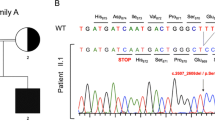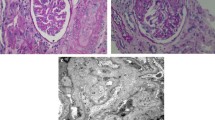Abstract
Deficiency of the ninth component of human complement (C9) is the most common complement deficiency in Japan but is rare in other countries. We studied the molecular basis of C9 deficiency in four Japanese C9-deficient patients who had suffered from meningococcal meningitis. Direct sequencing of amplified C9 cDNA and DNA revealed a nonsense substitution (CGA→TGA) at codon 95 in exon 4 in the four C9-deficient individuals. An allele-specific polymerase chain reaction system designed to detect exclusively only one of the normal and mutant alleles indicated that all the four patients were homozygous for the mutation in exon 4 and that the parents of patient 2 were heterozygous. The common mutation at codon 95 in exon 4 might be responsible for most Japanese C9 deficiency.
Similar content being viewed by others
Author information
Authors and Affiliations
Additional information
Received: 28 December 1997 / Accepted: 25 February 1998
Rights and permissions
About this article
Cite this article
Kira, R., Ihara, K., Takada, H. et al. Nonsense mutation in exon 4 of human complement C9 gene is the major cause of Japanese complement C9 deficiency. Hum Genet 102, 605–610 (1998). https://doi.org/10.1007/s004390050749
Published:
Issue Date:
DOI: https://doi.org/10.1007/s004390050749




